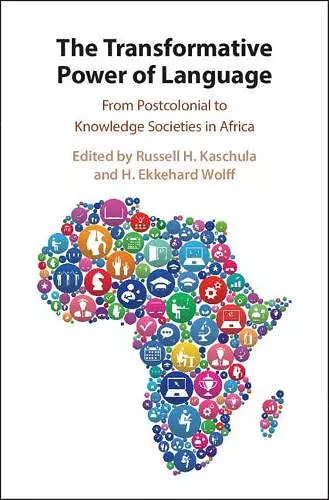The Transformative Power of Language
From Postcolonial to Knowledge Societies in Africa
H Ekkehard Wolff editor Russell H Kaschula editor
Format:Hardback
Publisher:Cambridge University Press
Published:10th Sep '20
Should be back in stock very soon
This hardback is available in another edition too:
- Paperback£26.00(9781108712774)

A new study of the importance of language for sociocultural change in Africa, from postcolonial to globally competitive knowledge societies.
With contributions from a team of global scholars, the book highlights the role of language in sociocultural, academic and economic advancement, in postcolonial Africa. It explores how the integration of global and local linguistic and cultural resources help to achieve mental decolonisation and create globally competitive knowledge societies.Language has played a pivotal role in societal transformation in postcolonial Africa towards the creation of globally competitive knowledge societies; however so far, this role has been under-researched and under-estimated. This volume addresses this gap in the literature, by bringing together a team of globally-recognised scholars to explore the effect of language on African postcolonial societies, and how it has contributed to achieving 'mental decolonisation'. A range of languages are explored, both imported (ex-colonial) and indigenous African, and case studies from different spheres of public discourse are investigated, from universities to legal settings. Demonstrating that multilingualism is a resource for, rather than barrier to, successful transformation, this book brings the intellectualisation and institutionalisation of African languages to the forefront of development discourse, and provides an insightful snap-shot of how current academic research, public discourse, political activism and social community engagement have contributed to societal transformation in South Africa.
'A welcome and important contribution to the study of the role of language in its broader social context. The focus on language as an agent of development and societal change, and particularly the use of local languages in the decolonization of higher education and knowledge creation in Africa, is especially welcome.' Bruce Connell, Professor of Linguistics, York University
'This volume responds to Ngugi wa Thiong'o's call to 'decolonise the mind' in countries of the Global South, particularly in Africa. The authors draw attention to: the necessity of, how to bring, and how to resource multilingual pedagogies in higher education. It is knowledge that resides within African languages that will unsettle coloniality and empower 'southern' scholars to bring about educational transformation in the Global South.' Kathleen Heugh, Associate Professor in Applied Linguistics, University of South Australia
'… the book is suitable for different audiences including policy makers, executive managers, student teachers, and educators, especially those working in Higher Education Institutes (HEIs) and those working in South Africa. The language of the book is also accessible and is clear for students at the undergraduate and graduate levels. The book provides an excellent starting point for researchers, students and educators who are interested in themes related to the power of languages in education, inclusion, the importance of education using the first language and those who are interested in the South African context or similar contexts.' Shaden Samir Attia, The LINGUIST List
ISBN: 9781108498821
Dimensions: 235mm x 160mm x 30mm
Weight: 700g
396 pages